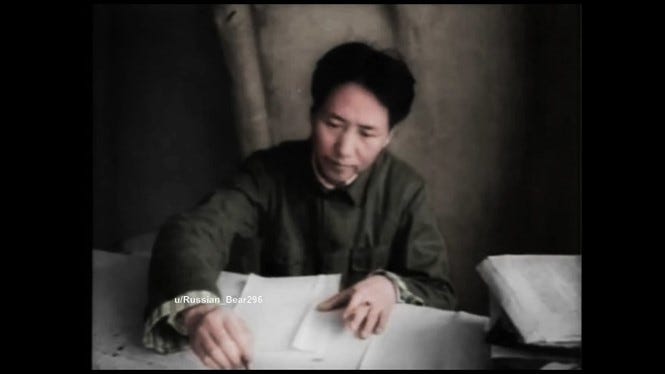Poems of Mao
19. Occupation of Nanking by the People’s Liberation Army [April 1949]
Occupation of Nanking by the People’s Liberation Army [April 1949]
[ a shih in seven-word regular, Chi Lu]
[translated by Nancy Lin]
As the host of our mighty million
Sweep across the Grand Yangtse,
A storm over Mount Chungshan
Spouts vapors of yellow and blue.
This citadel of the South
Does crouch tiger-like now
And coil with a dragon’s majesty
Never known before.
O, the thorough overturn of Heaven and Earth!
The pathos and the joy!
So track down the desperate foe
In a last dash of valor;
Barter not, the Old Conqueror’s fashion,
For an all-too-human name.
The sky would have wrinkled with age
Had it trifled with sentiments.
What marks the course of men
Is the Flood-tides and Mulberry-fields.
Notes [by Nancy Lin]
With the order for a nation-wide offensive at dawn, April 21st 1949, the Red Army started the forced crossing of the Yangtse along a front of 500 kilometres between Kiukiang and Chiangyin, and liberated Nanking on April 23 – what ended in effect the 22-year Kuomintang rule in China. This poem commemorates this historic event.
Chungshan, also called Hill of Purple Gold, is situated east of the city of Nanking. It has been described by classical writers as ‘a coiling dragon’ while Nanking as ‘a crouching tiger’ – both together constituting an imposing landscape suitable as a city for the nation’s capital.
The Old Conqueror: Hsiang Yu, the warrior-tyrant of Chu in the third century B.C. who allowed his political rival Liu Pang to occupy the western part of the empire and gained a reputation of magnanimity, only to find his life and domain lost to Liu a couple of years afterwards. In his warning against repeating the mistaken policy of Hsiang Yu, the poet is alluding to the counsel of compromise with Chiang Kai-shek then current both within and without the CPC.
Flood-tides and Mulberry-fields, a traditional figurative phase meaning the vicissitudes in this transient world, is based on the ancient story of Fairy Maku who had three times seen the surging sea dry up and turn into fields grown with mulberry trees. The metaphor is used by the poet here to suggest rather the law of change as the inexorable dialectics of nature and history.
[This is one of my favorite, and one of Mao’s most incisive and decisive poems, warning the people against acting Hamlet-like, but instead to realize what is truly their destiny -
“What marks the course of men is the Flood-tides and Mulberry-fields.”
Oh, if only our western leaders today would stop thinking like politicians and begin thinking like poets. Then we could bury the Hegelian dialectic in the dung-heap of failed narratives, and replace it with the dialectics of flood-tides and mulberry-fields!!!]
[next - 20. Reply to Mr. Liu Ya-tsu, April 1949]




On the Trail of Treason - https://duckduckgo.com/?q=mao+nixon+kissinger&iax=images&ia=images&iai=https%3A%2F%2Flemurinn.is%2Fwp-content%2Fuploads%2F2013%2F10%2FHenry_Kissinger_shakes_hands_with_Mao_Tse-Tung_Chairman_of_Chinese_Communist_Party_-_NARA_-_7062596-670x475.jpg